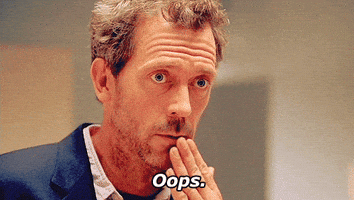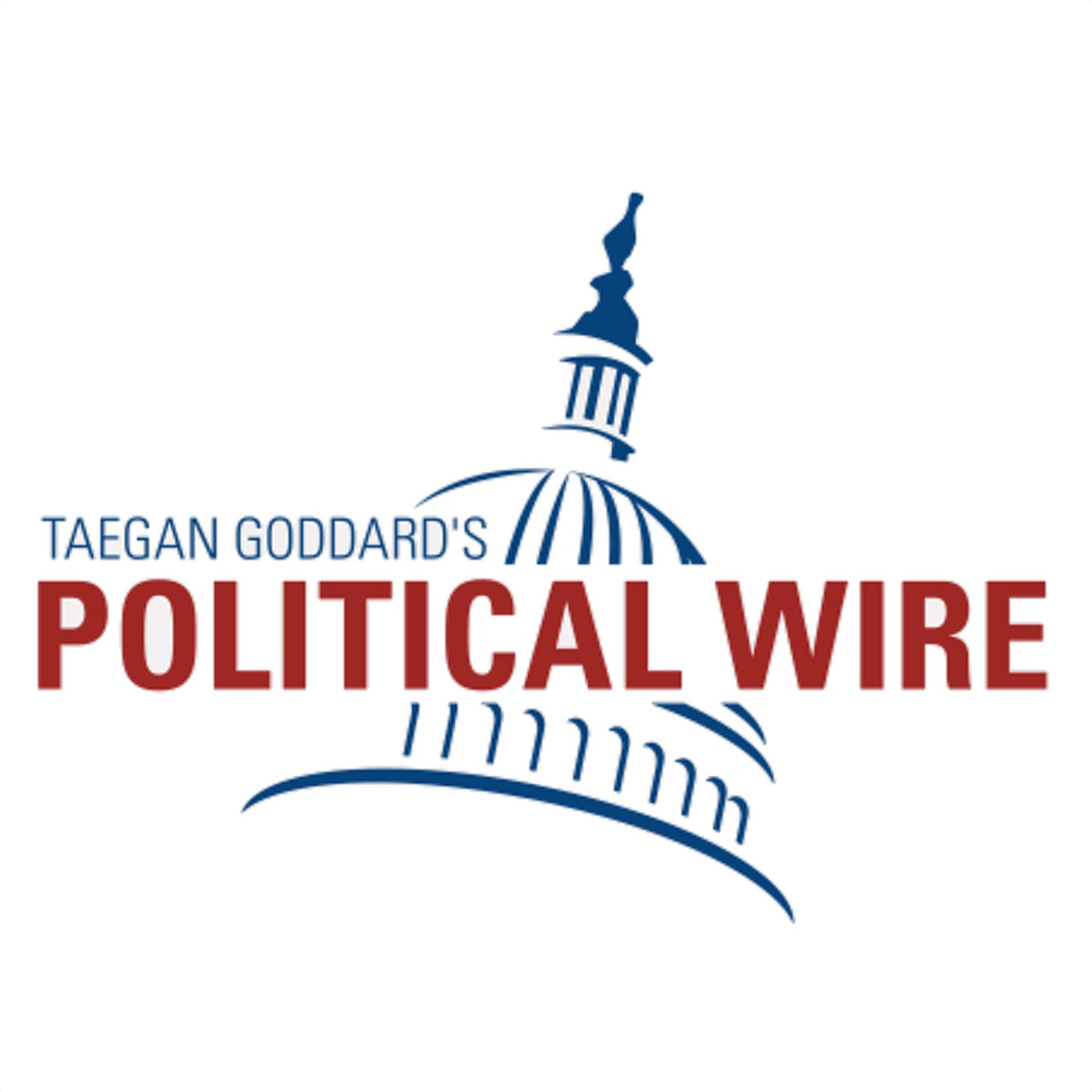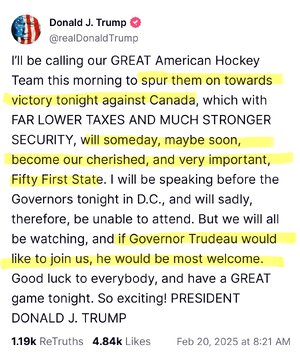The problem is creating lies about problems that don't exist and wasting money on solutions that aren't needed and /or don't work provided by con men who steal from us. I'd refer to you to the record of all the graft that occurred during Covid but Trump squashed the investigations and hid the records.What’s the harm? Nothing wrong with government accountability.
Navigation
Install the app
How to install the app on iOS
Follow along with the video below to see how to install our site as a web app on your home screen.
Note: This feature may not be available in some browsers.
More options
You are using an out of date browser. It may not display this or other websites correctly.
You should upgrade or use an alternative browser.
You should upgrade or use an alternative browser.
Trump / Musk (other than DOGE)
- Thread starter nycfan
- Start date
- Replies: 12K
- Views: 665K
- Politics
MOUNTAINH33L
Iconic Member
- Messages
- 1,034
and they will also beg for a second helping.You keep saying this despite don and musk firing all the employees tasked with holding government accountable. I’ll say it again, you’re eating lies covered in shit, and nod your head when they tell you it’s filet.
Iow, coprophagic MAGAts eat their own. Recycling?and they will also beg for a second helping.
- Messages
- 36,708

These feds took Trump’s ‘fork’ deal. Then they got fired — creating a government ‘mess.’
The Trump administration is racing to fix mistakes after some agencies fired probationary employees who had accepted the deferred resignation offer for federal workers.“Dave Elmstrom knew what he would do when the Trump administration’s resignation offer, titled “Fork in the Road,” landed in his inbox: take it.
Elmstrom, a probationary employee at the U.S. Department of Agriculture, had a job giving green-energy grants to farmers: an immediate target for Trump, he suspected.
He replied “resign” on Feb. 5, according to an email reviewed by The Washington Post. He also signed a resignation agreement, although no supervisor could tell him where to send it.
Eight days later, Elmstrom was fired for “performance.” A human resources worker told him probationary employees were no longer eligible for the “fork” offer.
Plunged into doubt, he pondered tapping into his savings — until, hours after The Washington Post contacted the Office of Personnel Management on Wednesday to ask about cases like Elmstrom’s, he received an email declaring he was accepted after all. …”
uncgriff
Honored Member
- Messages
- 811
remember when proto-MAGA called Obama an 'emperor' for signing a handful of executive orders LOL

 www.nbcnews.com
www.nbcnews.com

Republicans alarmed over Obama's executive orders, cheer Trump's on
Republicans who skewered President Obama as an "emperor" for his use of executive orders are cheering as President Trump issues a raft of his own.
- Messages
- 36,708
remember when proto-MAGA called Obama an 'emperor' for signing a handful of executive orders LOL

Republicans alarmed over Obama's executive orders, cheer Trump's on
Republicans who skewered President Obama as an "emperor" for his use of executive orders are cheering as President Trump issues a raft of his own.www.nbcnews.com
Obama calls Trump 'wannabe king' at Harris event
“That's not what you need in your life," he said.
Obama calls Trump 'wannabe king' at Harris event
Most polls show Vice President Kamala Harris and former President Donald Trump mostly neck-and-neck in key states with less than two weeks to go to Election Day.
“… “We do not need four years of a wannabe king -- a wannabe dictator running around trying to punish his enemies,” Obama said to cheers from the crowd. …”

- Messages
- 36,708

Musk’s X in Talks to Raise Equity at $44 Billion Valuation
Elon Musk’s X is in talks with investors to raise fresh equity capital at the $44 billion valuation at which Musk bought the social media firm, then known as Twitter, in 2022, Bloomberg reports. The
“If Musk succeeds, it would be an extraordinary turnaround given that X’s valuation has dropped sharply since the acquisition.”
“But it would be the latest sign that Musk’s closeness to President Trump is enhancing his status with investors.“
- Messages
- 36,708
D.C. U.S. attorney probing Democrats over alleged threats, documents show
Analysts say Ed Martin’s ‘Operation Whirlwind,’ which targets statements by Democrats and others about Elon Musk, justices and government workers, is meant to stifle criticism.——
Actual threats against government officials absolutely should be investigated, BTW. But initial steps under the aegis of this project suggest another purpose.
DougDaBroadcasta
Distinguished Member
- Messages
- 302
NancyReaganSaysWhat?“Shadow presidency”
Something the left knows all about.
- Messages
- 36,708
“… The email was obtained by The Post, as well as additional “letters of inquiry” sent by Martin to Rep. Robert Garcia (D-California) and Senate Minority Leader Charles E. Schumer (D-New York). Martin requested Garcia “clarify” statements regarding Musk on CNN last week and stepped up a previously reported demand that Schumer explain statements about two conservative Supreme Court justices in 2020.D.C. U.S. attorney probing Democrats over alleged threats, documents show
Analysts say Ed Martin’s ‘Operation Whirlwind,’ which targets statements by Democrats and others about Elon Musk, justices and government workers, is meant to stifle criticism.
——
Actual threats against government officials absolutely should be investigated, BTW. But initial steps under the aegis of this project suggest another purpose.
… Legal analysts called Martin’s direct inquiries to lawmakers highly irregular and his discussion of investigative targets troubling. They criticized his overall approach as a test of the boundaries of free-speech protections.
“I’ve never seen anything like these letters from a U.S. attorney,” said Barbara McQuade, a former federal prosecutor and University of Michigan law professor. Prosecutors typically leave it to agents to investigate cases so they do not themselves become witnesses, and department policy is to neither confirm nor deny the existence of investigations to protect the reputations of uncharged subjects as well as to avoid tipping them off, she said.
… In the letter to Garcia, sent Monday, Martin requested that he “clarify” an incendiary statement on CNN after the congressman participated in the first House subcommittee hearing on Musk’s DOGE, which stands for Department of Government Efficiency.
“What the American public wants is for us to bring actual weapons to this bar fight,” Garcia said. “This is an actual fight for democracy.”
Martin’s letter to Garcia said the comment “sounds to some like a threat to Mr. Musk … and government staff who work for him. Their concerns have led to this inquiry. … We take threats against public officials very seriously. I look forward to your cooperation.” …”
"It's all in the stars."NancyReaganSaysWhat?
- Messages
- 36,708
Cont’d
“… Martin’s initiative carried a partisan edge, however, borrowing its title from language Schumer used five years ago.
Martin has written three letters to Schumer about his quickly walked-back statement in a March 4, 2020, rally that two of Trump’s recently nominated Supreme Court justices, Neil M. Gorsuch and Brett M. Kavanaugh, “have released the whirlwind, and … will pay the price” for a decision against abortion rights.
Calling Schumer’s failure to respond disappointing and “unacceptable,” Martin copied the Senate leader’s legal counsel by email to a Feb. 11 letter demanding an answer, saying, “Time is of the essence,” and “Your cooperation is more important than ever to complete this inquiry before any action is taken. I remind you: no one is above the law,” bold-typing the final six words. …”
“… Martin’s initiative carried a partisan edge, however, borrowing its title from language Schumer used five years ago.
Martin has written three letters to Schumer about his quickly walked-back statement in a March 4, 2020, rally that two of Trump’s recently nominated Supreme Court justices, Neil M. Gorsuch and Brett M. Kavanaugh, “have released the whirlwind, and … will pay the price” for a decision against abortion rights.
Calling Schumer’s failure to respond disappointing and “unacceptable,” Martin copied the Senate leader’s legal counsel by email to a Feb. 11 letter demanding an answer, saying, “Time is of the essence,” and “Your cooperation is more important than ever to complete this inquiry before any action is taken. I remind you: no one is above the law,” bold-typing the final six words. …”
- Messages
- 36,708
Cont’d
“… Martin’s initiative carried a partisan edge, however, borrowing its title from language Schumer used five years ago.
Martin has written three letters to Schumer about his quickly walked-back statement in a March 4, 2020, rally that two of Trump’s recently nominated Supreme Court justices, Neil M. Gorsuch and Brett M. Kavanaugh, “have released the whirlwind, and … will pay the price” for a decision against abortion rights.
Calling Schumer’s failure to respond disappointing and “unacceptable,” Martin copied the Senate leader’s legal counsel by email to a Feb. 11 letter demanding an answer, saying, “Time is of the essence,” and “Your cooperation is more important than ever to complete this inquiry before any action is taken. I remind you: no one is above the law,” bold-typing the final six words. …”
Schumer was widely, but not universally, criticized for this particular incendiary rhetoric (as well as pathetic delivery) at the time:
From the WaPo article: “… In that floor speech on March 5, 2020, Schumer expressed regret following rebukes from then-Senate Majority Leader Mitch McConnell (R-Kentucky) and Chief Justice John G. Roberts Jr. “I shouldn’t have used the words I did, but in no way was I making a threat. I never — never — would do such a thing,” Schumer said, while calling it a “gross distortion” to imply that he intended anything other than the court would face political and public opinion consequence. …”
But seems well below a threshold for a government investigation …
- Messages
- 7,453
Our board Trump voters whined and cried for 4 years that Joe Biden wasn’t actually the president, so now that is equally as obvious that Donald Trump is not actually the president, naturally, they are suddenly completely fine with it. Hey, maybe the hypocrisy is the point!
- Messages
- 2,699
immature fetish is precisely the apt description of that kind of thinking.Since something like 85%+ of fentanyl comes into the U.S. via U.S. citizens - who I presume are not Mexican cartel members- at legal ports of entry, are we going to drone strike them, too?
I remember when I was a Republican, I used to think that the way to solve the issue of all of the bad guys in the world was to just sic the U.S. military on them and bomb them into oblivion. Then, I grew up, got over my immature fetish of thinking that we can simply do whatever the fuck we want because we have a strong military, other countries and other people be damned, and I joined the real world where there’s tons of nuance and gray area and no easy solutions to complex problems. Coincidentally, I was no longer Republican by that time!
It goes without saying: fuck the cartels, fuck criminals. But also, fuck people who think that violation of another country’s sovereignty and probable collateral damage of its citizens is the proper way to conduct our affairs.
- Messages
- 2,233
Right on cue Kathy Hochul holds an impromptu press conference to proclaim that NYers will fight the "King" just like they did against King George III. I only wish Schumer would have been available to help with the visuals. Dems really need to stop taking Trump's bait. It's too easy. Trump's got you defending social secuirty/medicare/medicaid fraud, foreign aid for transgender drag shows and federal employees whining about returning to work after 4+ years.That's right, MAGA. Kneel before your God-King.
Plus, you require her to defend the congestion tax which cost ordinary NYers $500 per month.
- Messages
- 36,708
Farmers feeling weight of Trump policies with shutdown of aid

Farmers feeling weight of Trump policies with shutdown of aid
In the last two presidential elections, farmers voted overwhelmingly for Donald Trump, but now some are saying his efforts to cut the government are causing major financial pressure. William Brangham reports and speaks with Nick Levendofsky, executive director of the Kansas Farmers Union, for...
“… two of the biggest changes affecting farmers are a freeze on some USDA programs and a near-shutdown of spending by USAID, which buys about $2 billion of products from farmers every year. About 40 percent of the government's food assistance comes from American farms.
Others say they're on the hook for contracts for renewable energy equipment that the government promised to help with. We talked to several people in this field, a flower farmer, a beekeeper, a produce farmer, and the CEO of a nonprofit that delivers food aid to children in Haiti.
…
You mentioned the cuts that are happening, the freezes and all of those things. But those high-cost inputs are what's really hurting right now, the seed, the chemicals, the fertilizers, the fuel that is needed. Farm equipment is extremely expensive. And bankers are not loaning out tons of money to farmers right now.
In fact, bankers are pulling back. And then you throw in the idea of more tariffs, a trade war, and then the cuts to positions at USDA just at the end of last week, crucial positions in the Farm Service Agency offices, the NRCS offices that are all over the country, these are folks who are integral to American agriculture. And those positions are now gone and people that were working in those offices have now had to pick up more of the slack. …”
MOUNTAINH33L
Iconic Member
- Messages
- 1,034
Trump doesn't have ME defending shit. MAGAs have had to defend this bat shit lunacy pretty much from the start. It's sad, but it's not surprising. Loyalty to the king above all else. It's pretty sad that folks would need to avoid taking Trump's bait. I mean what's that about? He's the goddamn POTUS (or king if you're MAGA). He's not a reddit poster or just some internet troll. I expect better from the "leader of the free world". Maybe that's on me. Also I don't live in NYC so I'm not real up to speed on what this congestion tax issue is nor do I care to educate myself on the particulars. Again, I'm not defending shit. I'm pointing out the obvious. MAGA must kneel and obey their king no matter what. MAGA fealty.Right on cue Kathy Hochul holds an impromptu press conference to proclaim that NYers will fight the "King" just like they did against King George III. I only wish Schumer would have been available to help with the visuals. Dems really need to stop taking Trump's bait. It's too easy. Trump's got you defending social secuirty/medicare/medicaid fraud, foreign aid for transgender drag shows and federal employees whining about returning to work after 4+ years.
Plus, you require her to defend the congestion tax which cost ordinary NYers $500 per month.
Share:

